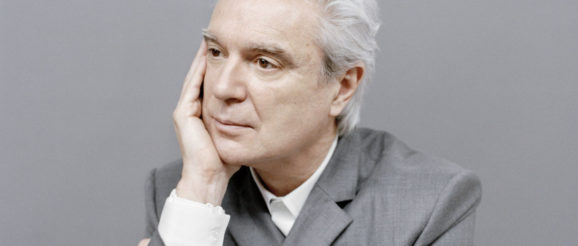Profiles in Innovation: David Byrne

Profiles in
Innovation:
David Byrne
Words: Steve Smith
Images: Jody Rogac
This essay is one in a series of profiles showcasing musical luminaries who will be honored in the 2019 National Sawdust Gala, to be held on May 7 at Sotheby’s in New York City. For more information, see .
“My formative years were in the late ’60s, when I was in high school. And from my point of view, there was a lot of musical experimentation that was going on then—and it was all considered very cool. It was an acceptable thing to do, and also, kind of amazingly, some of it was very popular. People were doing these very out things, and they were having hit songs with some of this stuff.”
Not that David Byrne is looking back wistfully to times long gone. Instead, the Scottish-American singer, songwriter, bandleader, and multi-disciplinary artist draws a straight line from what he experienced in his youth to what’s happening right now. When we spoke, he was preparing to induct Radiohead into the Rock and Roll Hall of Fame later that week.
“There’s another example,” Byrne said. “They started out as sort of a more conventional band, and then just went way off into absorbing other kinds of music—but they just got more and more popular.” And yet another band in this year’s Hall of Fame class, Roxy Music, made its mark initially with a combination of fashionable glam rock and avant-garde experimentation provided by one of its members, Brian Eno—who in time would serve as a catalyst for change for Byrne and the band with which he became world famous: Talking Heads.
David Byrne
Photograph: Jody Rogac

Here, too, was an example of a group whose forays far afield of the commercial mainstream – from lean, wiry rock into deep Afrobeat grooves and wider excursions – contributed to wider success. Even before Talking Heads ran its course in 1991, Byrne was exploring farther still in collaborations with artists like Eno, Robert Wilson, and Twyla Tharp. And even as he delved into fresh artistic disciplines, his musical vocabulary continued to grow richer and more daring.
Throughout, Byrne adhered to a fluid view of history, finding newness in past creations as readily as in contemporary work. Luaka Bop, the highly regarded record label he founded in 1990, has introduced listeners not only to new acts from around the world, but to deep veins of lost musical lore.
“What I discovered at some point in my life is that the past can be as relevant as the future,” Byrne says. “Everything that’s new isn’t happening now, or in the future. Some of the things that are new to you, or to a music audience, might be something that happened in the past. You find it, and it’s new to you. It’s inspirational, and you go, wow, who knew that that happened?”
Still, Byrne continues to pursue new experiences and fresh inspiration. “I don’t go out as much as I used to, but I still go out pretty regularly… I would say once or twice a week,” he says. (As it happened, in the week preceding our conversation he’d attended three plays.) “I’m willing to go see something and feel like, I may not like everything about what I’m going to see or hear, but there’s always going to be something that I can learn and apply to my work.”
Share this entry
